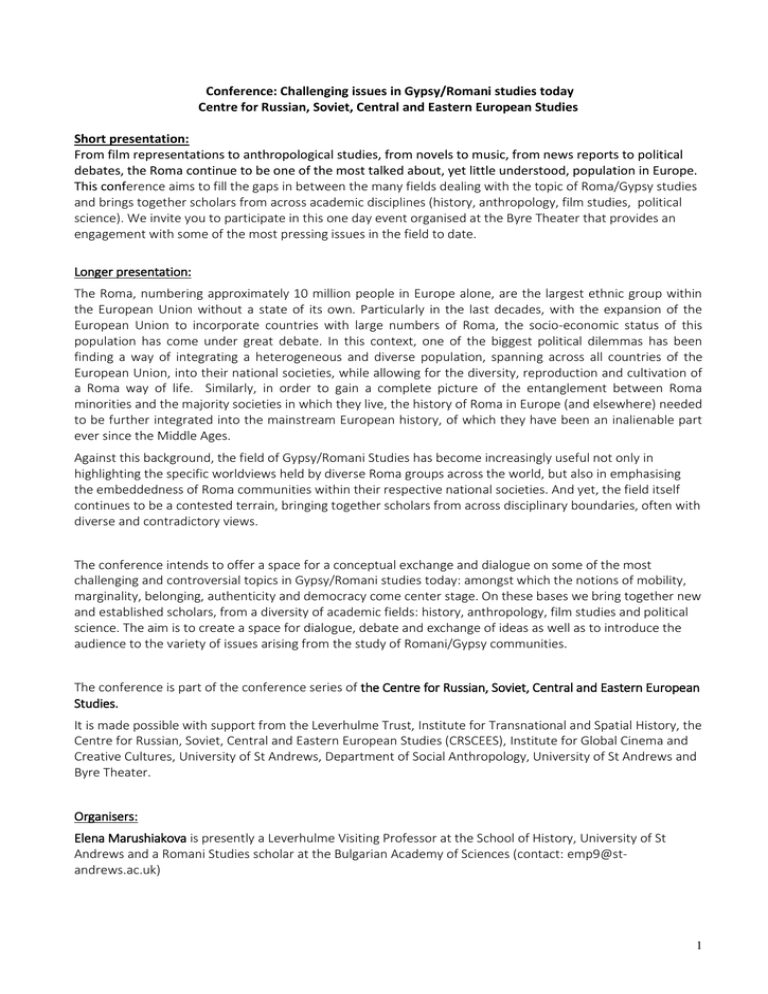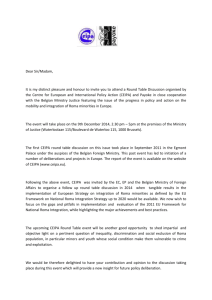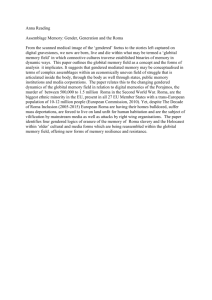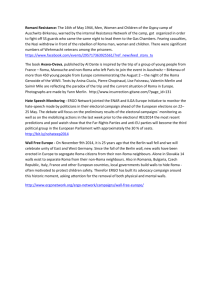Conference: Challenging issues in Gypsy/Romani studies today
advertisement

Conference: Challenging issues in Gypsy/Romani studies today Centre for Russian, Soviet, Central and Eastern European Studies Short presentation: From film representations to anthropological studies, from novels to music, from news reports to political debates, the Roma continue to be one of the most talked about, yet little understood, population in Europe. This conference aims to fill the gaps in between the many fields dealing with the topic of Roma/Gypsy studies and brings together scholars from across academic disciplines (history, anthropology, film studies, political science). We invite you to participate in this one day event organised at the Byre Theater that provides an engagement with some of the most pressing issues in the field to date. Longer presentation: The Roma, numbering approximately 10 million people in Europe alone, are the largest ethnic group within the European Union without a state of its own. Particularly in the last decades, with the expansion of the European Union to incorporate countries with large numbers of Roma, the socio-economic status of this population has come under great debate. In this context, one of the biggest political dilemmas has been finding a way of integrating a heterogeneous and diverse population, spanning across all countries of the European Union, into their national societies, while allowing for the diversity, reproduction and cultivation of a Roma way of life. Similarly, in order to gain a complete picture of the entanglement between Roma minorities and the majority societies in which they live, the history of Roma in Europe (and elsewhere) needed to be further integrated into the mainstream European history, of which they have been an inalienable part ever since the Middle Ages. Against this background, the field of Gypsy/Romani Studies has become increasingly useful not only in highlighting the specific worldviews held by diverse Roma groups across the world, but also in emphasising the embeddedness of Roma communities within their respective national societies. And yet, the field itself continues to be a contested terrain, bringing together scholars from across disciplinary boundaries, often with diverse and contradictory views. The conference intends to offer a space for a conceptual exchange and dialogue on some of the most challenging and controversial topics in Gypsy/Romani studies today: amongst which the notions of mobility, marginality, belonging, authenticity and democracy come center stage. On these bases we bring together new and established scholars, from a diversity of academic fields: history, anthropology, film studies and political science. The aim is to create a space for dialogue, debate and exchange of ideas as well as to introduce the audience to the variety of issues arising from the study of Romani/Gypsy communities. The conference is part of the conference series of the Centre for Russian, Soviet, Central and Eastern European Studies. It is made possible with support from the Leverhulme Trust, Institute for Transnational and Spatial History, the Centre for Russian, Soviet, Central and Eastern European Studies (CRSCEES), Institute for Global Cinema and Creative Cultures, University of St Andrews, Department of Social Anthropology, University of St Andrews and Byre Theater. Organisers: Elena Marushiakova is presently a Leverhulme Visiting Professor at the School of History, University of St Andrews and a Romani Studies scholar at the Bulgarian Academy of Sciences (contact: emp9@standrews.ac.uk) 1 Raluca Bianca Roman (co-organiser) is a PhD student in the Department of Social Anthropology, University of St Andrews and an Academy of Finland visiting researcher at the Center for Nordic Studies (CENS), University of Helsinki. (contact: rr44@st-andrews.ac.uk) Conference date and venue: Friday, November 6th, Byre Theatre (Abbey St, St Andrews, Fife KY16 9LA). For further details contact organisers PROGRAMME Opening of conference: 09.00 Session One: 09.15 – 10.45 Paloma Gay y Blasco (University of St Andrews) Beyond the anthropology of Roma Dina Iordanova (University of St Andrews) Why So Many Films Opt to Deal with the Roma? Jan Grill (University of Manchester) Uses and abuses of ‘forced’ in the context of Roma migration research Coffee break: 10.45 – 11.15 Session Two: 11.15 – 12.45 Elena Marushiakova and Veselin Popov (University of St Andrews/ Bulgarian Academy of Sciences). From Roma Muslims to Romani Islam. Antonio Montañes (Complutense University of Madrid) Gitano Identity and Religion: The role of ethnicity and distinction in Gitano conversion to Pentecostalism in Spain. Raluca Bianca Roman. (University of St Andrews) Inbetweeners: belonging and non-belonging among the Finnish Roma Lunch: 12.45 – 14.00 Session Three: 14.00 – 15.30 Sofiya Zahova (Bulgarian Academy of Sciences) Early marriages among Roma: The case of Bulgaria Juraj Marušiak (Institute of Political Science, Slovak Academy of Sciences) “Roma issue” and democracy de-consolidation in Slovakia 2 Peter Stadius (Center for Nordic Studies, University of Helsinki) Political culture of the majority and Roma minorities: The Nordic Case Coffee break: 15.30 – 16.00 Session Four: 16.00 – 17.00 Marcos Toyansk Guimarais (University of São Paulo & University of Seville) Identity, authenticity and belonging: Contrasting the cases of European and Brazilian Gypsies Martin Fotta (Goethe University, Frankfurt/Main) Between ‘nomadic cosmology’ and traditional people’s ideology: Cigano nomadism and the Calon spatiality in Brazil Open discussion: 17:00 – 18:00 3



